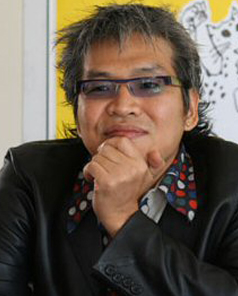
 |
|
Hangul Celluloid’s one-on-one interview with director Im Sang-soo, which took place at the Korean Cultural Centre UK on Sunday 14th November 2010 at 3.30pm:
Hangul Celluloid: Your latest film, ‘The Housemaid’, has regularly been described as a reimagining, or contemporary reworking, of the 1960 Kim Ki-young film of the same name. Are you happy to have the filmed described in this way, or do you prefer it to be discussed in its own right, without reference to its predecessor? Im Sang-soo: I was always aware that comparisons would be made, and so I put in a line at the end of my film which says it was inspired by Kim Ki-Young’s ‘The Housemaid’, in order to reiterate that it’s not a remake necessarily, but whether it is considered as a totally different film or a remake is, I think, up to individual spectators to decide and I am happy to have it described in either way. Im Sang-soo: Although Kim Ki-young’s legendary film was my initial inspiration, I wasn’t necessarily shy about it in any way, nor did I feel any kind of great honour, but they were some very positive aspects relating to my career that came from being associated with it. Hangul Celluloid: Your films very often deal with sex, power and politics, with both your earlier work, ‘A Good Lawyer’s Wife’, and your current film, ‘The Housemaid’, being quite graphic and explicit, both in terms of nudity and content, but do you feel the themes of power and politics in the films relate to each other? Hangul Celluloid: With the explicitness of both ‘A Good Lawyer’s Wife’ and ‘The Housemaid’, were you concerned with audience reactions, in Korea, to the amount of nudity in both films? Hangul Celluloid: There are two scenes within ‘The Housemaid’ which show a large scar, or burn, on Jeon Do-yeon’s upper thigh, and even though I went back to look at some of her other work, I couldn’t find any other scenes showing it. As these scenes in ‘The Housemaid’ almost seemed to focus on it, and since Eun-yi also seemed overly preoccupied with seeing the dead body of the girl who committed suicide at the start of the film, I wondered if the scar was created using make-up to imply that there was something in Eun-yi’s past which viewers must draw their own conclusions about? Im Sang-soo: I’m almost frightened to answer this question, but I will answer it very honestly. Jeon Do-yeon does, in fact, have a scar there, and before filming began, she mentioned the scar to me because she knew that there were many scenes involving nudity within the film. I didn’t have a problem, or filming issues, with it at all, but as shooting progressed, I felt that the scar matched ideas within the film very well, so it is true that I had a couple of scenes specifically focussing on it. We could have erased it with computer graphics, but I talked to Jeon Do-yeon about it and we both agreed that it matched the film so well that it should be kept in. There was no deliberate link between those scenes and the beginning of the film, but I am very happy for spectators to link the two together, and add to the character’s past, as that very much fits with the ideas of the film too. Hangul Celluloid: To wrap things up, I’d like to ask how you feel about reviews in general and reviews of your films? I would like to sincerely thank Paul Koren, the Korean Cultural Centre UK and The London Korean Film Festival for giving the opportunity to interview director Im Sang-soo. A special thanks also goes to An Ji-yoon, who worked as the translator in the interview. Once again, she put up with my overlong ramblings, as well as my going off on tangents, and did an exemplary job.
|
|
